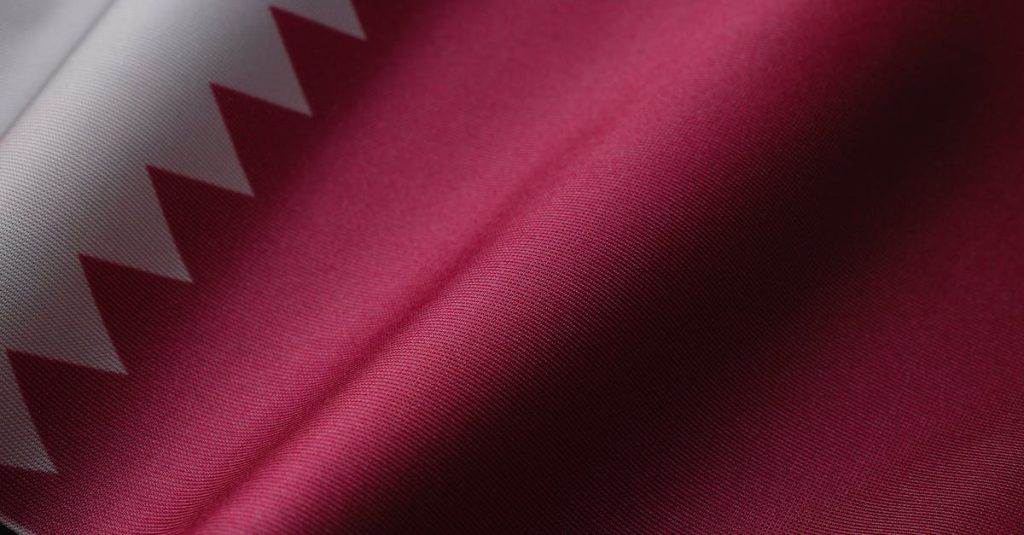The Qatar flag is a symbol of pride and unity that tells a story steeped in history and tradition. With its distinct maroon color and nine-point serrated edge, it’s not just a national emblem but a piece of art that holds deep significance for the country’s citizens and admirers alike.
In this article, we’ll delve into the meaning behind the colors and design of the Qatar flag, exploring how it reflects the nation’s identity and heritage. Whether you’re a history buff, a cultural enthusiast, or simply curious, you’ll find the flag’s rich tapestry as intriguing as the country it represents.
Discover the fascinating facts and hidden nuances of the Qatar flag that make it one of the most unique and recognizable flags around the world. Get ready to be captivated by the story behind the vibrant maroon and white that waves proudly in the desert air.
History of the Qatar Flag
The flag of Qatar is steeped in a rich history that’s as vibrant as the maroon hue that characterizes it. The distinct white and maroon colors divided with a serrated line reflect Qatar’s past and the nation’s journey to independence.
Originating in the 19th century, the design evolved from the original red flag used by the Qatari people, which bore a strong resemblance to the flag of the neighboring nation of Bahrain. However, due to the harsh sun, the red dye used would fade over time to a shade closer to maroon. To avoid confusion at sea and to claim a unique identity, this distinctive color, known as Qatar maroon, was officially adopted.
The flag underwent official modification when Qatar became a protectorate of Britain. In 1932, a white stripe was added to signify the peace brought about by the treaty with the British and to differentiate it further from Bahrain’s standard. The serrated edge, consisting of nine points, was added to signify Qatar as the 9th member of the ‘Reconciled Emirates’ following the conclusion of the Qatari-British treaty.
Later alterations were minimal but significant. The flag’s dimensions were officially established as an extraordinary aspect ratio of 11:28, making it the only national flag with a width more than twice its height. This peculiarity adds to the flag’s distinctiveness and is symbolic of the unique path Qatar has taken among its Middle Eastern counterparts.
Today, the flag is a beacon of pride for Qataris, representing the heritage, sovereignty, and unity of the nation. It flies high over government buildings, at national events, and in the hearts of Qatar’s citizens. From its adaptive color to its serrated edge, every aspect of the flag reveals a chapter of Qatar’s journey as it navigates its place in the region and the wider world.
Design and Colors of the Qatar Flag
The Qatar flag boasts a distinctive design that carries deep meaning and reflects the nation’s identity. The maroon color on the flag is notably unique, officially known as Qatar Maroon. This color symbolizes the bloodshed during the various wars Qatar has undergone, as well as the historic purple dye trade. The maroon contrasts sharply with the flag’s left white band, which stands for peace.
Adjacent to the white band, the flag features its most distinguishable trait – a serrated edge with nine points. These points not only echo Qatar’s significance as the 9th member of the ‘Reconciled Emirates’ but they also represent the country’s close connection to the Islamic world.
When examining the design, it’s important to recognize the flag’s official proportions. With an aspect ratio of 11:28, the Qatar flag is noted for having the World’s Only Width More Than Twice Its Height. This unusual ratio serves to make the flag readily identifiable even from afar.
Color consistency plays a pivotal role in maintaining the flag’s integrity. Over time, the maroon shade used in the Qatar flag has undergone standardization to prevent variations. Ensuring the correct shade adorns national and international representations is a matter of national pride.
The design elements of the flag serve multiple functions, from recounting Qatar’s history to symbolizing their aspirations. The flag is flown during national holidays, sporting events, and in diplomatic contexts, signifying the solidarity and pride of the Qatari people.
Throughout the years, the Qatar flag has been leveraged as a tool for branding and diplomacy, shaping the image of a nation that upholds its rich traditions while forging ahead in the global arena. Displaying a strong visual identity, the flag continues to be respected and recognized worldwide.
Symbolism and Meaning of the Qatar Flag
The Qatar flag carries deep symbolic meanings that resonate with its citizens and play a pivotal role on the international stage. The maroon and white colors are more than just design choices; they embody the nation’s identity and ethos. The maroon represents the sanguine aspects of its history, notably the bloodshed in defense of the nation and its historical trade in purple dye, a color once synonymous with power and wealth in the region. White stands for peace, reflecting Qatar’s commitment to stability and friendly relations with its neighbors.
In addition to the colors, the design elements of the Qatar flag hold significant meaning. The serrated edge, with its nine points, commemorates Qatar’s integration as the 9th member of the reconciled emirates of the Persian Gulf after the signing of the Qatari-British treaty. Furthermore, the nine points also have a religious connotation, subtly connecting the state with the broader Islamic world.
In the context of ratios, the flag’s 11:28 aspect ratio is not just unique, but it’s also one of the few national flags to have such distinct proportions. This elongated shape ensures that the flag remains distinctive and recognizable, a characteristic that reinforces its use as a powerful marker of national pride.
The Qatar flag’s color consistency is not merely an aesthetic consideration but a matter of national integrity. The specific shade of maroon has been carefully codified to ensure uniformity, further cementing the flag as a symbol of the nation’s sovereignty and unity.
In places where national identity is celebrated or sovereignty is exemplified, the Qatar flag is ever-present. It’s a staple in international forums, diplomatic affairs, and global sporting events where it symbolizes Qatar’s presence and influence. The flag’s ubiquitous use in these contexts highlights its role in branding the nation, shaping Qatar’s image domestically and abroad.
Importance of the Qatar Flag
The flag of Qatar serves as more than just a national emblem. It’s a visual representation of the country’s history, values, and aspirations. The deep maroon swirls against stark white capture the essence of Qatar’s past and present standing among nations.
National Identity and Unity
In Qatar, the flag is a crucial symbol of national identity and unity. It flies high on government buildings, schools, and public spaces, reminding Qataris of their shared heritage and values. It inspires solidarity, especially during national celebrations like Qatar National Day when the flag becomes a ubiquitous feature across the nation. The sight of the flag fosters a strong sense of belonging and patriotism among citizens.
International Representation
On the international stage, the Qatari flag represents the nation at embassies, global forums, and sports events, becoming a beacon of Qatari pride globally. As athletes hoist the flag high at international competitions, it unifies supporters and reflects the nation’s commitment to excellence and sportsmanship.
Symbolism in Design
Each element of the flag’s design serves to symbolize significant aspects of Qatari culture. The maroon color evokes the blood of the nation’s people, defending the country and their heritage. The white color embodies the peace and purity of the nation’s intentions. Together, the colors narrate a story of a people devoted to the progress and well-being of their nation coupled with an unwavering respect for their roots.
Cultural and Historical Significance
The flag’s uniqueness in color and design links present-day Qatar to its historical narrative, including its independence and its rise as a significant player on the world stage. The history reflected in the flag’s design is a constant reminder of where the nation has been and the direction it’s striving to go.
Through its use in education, the flag also becomes a tool for instilling national values and history in young Qataris, ensuring that the legacy of the nation continues to be honored and remembered by future generations.
Conclusion
The Qatar flag stands as a beacon of the nation’s rich history and the values it cherishes. Its distinctive maroon hue and unique design elements weave together a story of peace, unity, and the enduring spirit of the Qatari people. As a symbol deeply embedded in the country’s identity, the flag not only unites its citizens but also projects Qatar’s pride and ambition onto the global stage. For every Qatari, the flag is more than a national emblem; it’s a daily reminder of their shared heritage and the bright future they are building together.
Frequently Asked Questions
What is the significance of the maroon color on the Qatar flag?
The maroon color on the Qatar flag symbolizes the bloodshed in Qatar’s many wars as well as the country’s historic maritime strength.
Why does the Qatar flag have a white stripe?
The white stripe on the Qatar flag represents peace and also serves to differentiate it from the similar flag of Bahrain.
What do the nine points on the serrated edge of the Qatar flag signify?
The nine points on the serrated edge represent Qatar as the 9th member of the ‘Reconciled Emirates’.
What is unique about the Qatar flag’s dimensions?
The Qatar flag has a unique aspect ratio of 11:28, which is unusual compared to other national flags.
What do the elements of the Qatar flag’s design represent?
Each design element of the Qatar flag symbolizes significant aspects of Qatari culture, heritage, sovereignty, and unity.
How does the Qatar flag contribute to national identity?
The flag serves as a crucial symbol of national identity, fostering unity and solidarity among Qataris. It instills a sense of pride and belonging, linking the nation’s present to its historical narrative.
In what ways is the flag used in Qatar’s educational system?
The Qatar flag is used in education to teach young Qataris about their country’s values and history, promoting national pride and awareness from an early age.

